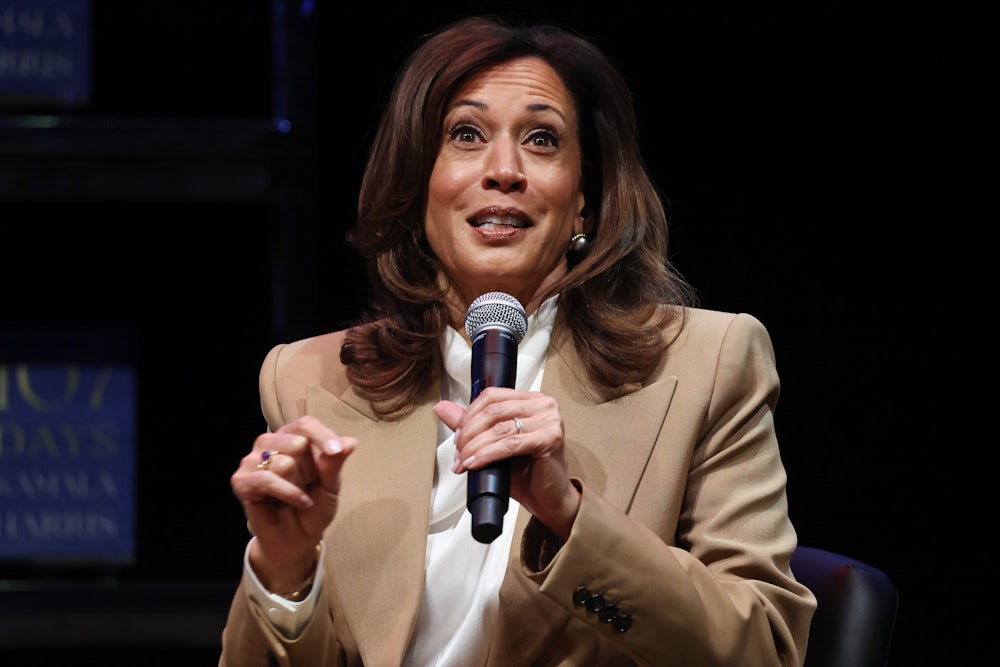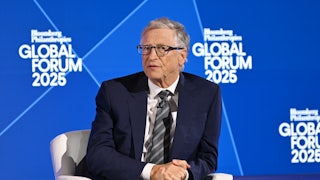A team of centrist Democratic consultants thinks they’ve figured out what went wrong in the 2024 election. The problem, apparently, was that the Democratic Party was insufficiently nostalgic for 1992.
The 60-page election postmortem report, titled “Deciding to Win,” was published by WelcomePAC—a political action committee that says it is working for a “big tent” Democratic Party but somehow lacks tent space for climate groups or trans people. The report is meticulously produced, with plenty of data and charts. But if you dig into it just a little, it becomes obvious that everything is arranged to support predetermined conclusions.
Donald Trump won in 2024, according to report co-authors Simon Bazelon, Lauren Harper Pope, and Liam Kerr, because Democratic candidates talked too much about divisive topics like climate and immigration and trans rights. Kamala Harris didn’t talk enough about “kitchen table” issues like the cost of living and prescription drug prices. The party platform had too many extreme positions, and voters noticed. The way forward, by their reasoning, is to support centrist candidates and moderate the party’s positions on immigration, public safety, climate, and “identity and cultural issues.”
There are a few problems with this thesis, which seems to get rehashed every single time Democrats lose an election. The most basic is that it assumes, in breezy fantasy borrowed from simpler times, that voters’ sense of the Democratic Party comes from the party’s policy platform and candidate speeches, rather than random tidbits absorbed from a propaganda-filled media environment.
What percentage of the public do you believe has any clue what is in the Democratic Party platform? I’ll give you a hint: It is lower than whatever number you just thought of. People also do not form impressions of the party based on canned answers, policy briefs, or stump speeches. The defining trait of the mass electorate is that they are an inattentive electorate. Their sense of the Democratic Party is shaped by stories that they incidentally hear, mostly as background noise.
To a certain degree, that has always been the case. The mass public has never lived up to our Democratic ideals, even in the golden age of broadcast journalism. But as our media outlets have fractured and been increasingly swallowed by algorithmic social media platforms, the situation has gotten worse. The Democratic Party does not have the capacity to control what people hear or think about it. If Democrats want to influence public opinion about the Democratic Party, then they are going to have to make a sustained investment in media organizations.
Pollsters and pundits don’t like to hear this, because it doesn’t fit their model of the world. Pollsters like to test messages with captured audiences who are being paid to pay attention. What works in focus groups and experimental settings, though, often does not translate to the real world of politics, where attention is fractured. The fight over attention is the central fulcrum point in contemporary politics.
This is the seemingly immutable advantage that Trump and the Republicans have over Democrats. It’s not that they have a better grasp of the values of some mythical heartland America. (They really don’t. This is the party that routinely attacks Disney and football. There is no cultural rake that they do not habitually step on.) Their advantage is that they spent decades building their own constellation of conservative propaganda outlets, and then they went out and purchased most of the mainstream outlets as well. Jeff Bezos owns The Washington Post. Patrick Soon-Shiong owns the Los Angeles Times. Larry Ellison’s son owns CBS, and is preparing a bid to purchase CNN. Ellison will also soon own a major share of TikTok. Elon Musk turned Twitter into X and filled it with right-wing propaganda.
In reality, Democratic politicians and Kamala Harris specifically talked little if at all about climate change and trans rights in 2024—and spoke constantly about “kitchen table issues.” WelcomePAC’s formula for success is precisely what Democrats tried. It failed. WelcomePAC’s only answer is, “Well, try it some more.”
The problem isn’t that “Deciding to Win” lacks data: The authors present plenty of data showing how voters’ perceptions of the two parties have changed since 2012. For example, in 2013, 51 percent of voters said the Democratic Party is “out of touch.” Today, that number has risen to 70 percent. Voters, when surveyed, list the economy as their top issue, and tell pollsters that the Democratic Party prioritizes other issues. But the authors don’t adequately probe what might be driving the data. It’s not that Democratic Party leadership has become too substantively radical, that’s for sure. And meanwhile the authors insist that the Republican Party has moderated on issues like abortion rights since 2012, which is plainly false. What happened was Republicans stopped talking so loudly about their proposals for a national abortion ban after they overturned Roe v. Wade and it became a looming possibility. That’s not policy moderation; it’s measurement error.
Elections are determined by four broad factors: (1) your message, (2) the messenger, (3) the media environment, and (4) the moment. The only thing that political campaigns have complete control over is the message. We control the words that come out of our own mouths. And so there is a long-standing bad habit among the pundit class of treating those words as though they are the only thing that matters.
The other three factors have increasingly large effects on who wins elections, but also are increasingly hard to influence. The party has some impact on candidate selection (messengers). They don’t get to design the perfect candidate in a hermetically sealed lab, but they can provide resources and support to candidates who seem more likely to win. And sometimes voters choose a candidate that the party leadership doesn’t like.
It takes decades to build media capacity and media organizations that can make a dent in the broader media environment. On the timescale of a single election cycle, you do the best you can with what you have. And it really doesn’t help that all the tech centibillionaires have become Trump courtesans. There are no progressive centibillionaires. Building media capacity takes more time and more resources than the Democratic Party has close at hand.
And the broader moment—the mood of the electorate, the state of the economy, anti-incumbent sentiment, etc.—is inherently slippery stuff: It’s shaped by policy in the long run, but in the short run you are stuck playing the hand you are dealt. Kamala Harris would have fared better in 2024 if the economy had never gone through inflation, or if Covid-19 had never mutated into the delta and omicron variants and the “hot vax summer” of 2021 had been the hoped-for abrupt end of the pandemic.
If the Democratic Party wants to build power and win elections in the long term, it has to keep all four of those factors in mind—not just the knobs that are easiest to turn. That’s the kind of tunnel-vision thinking—focusing only on those factors that you can most immediately control—that has put the party at an increasing disadvantage over the past few decades.
The report has no answer to the media ownership problem. It doesn’t even raise it as a question. It includes pages upon pages bemoaning the Democratic Party’s messaging woes, without ever considering that the problem might be that its opponents have access to much larger megaphones.
“Deciding to Win” also displays little awareness of what winning elections is for. There is an obvious reason why the Democratic Party ought not abandon its commitment to preventing the climate crisis: a hotter future with more extreme weather events is a future where the moment will often be stacked against incumbents and their broadly democratic values. Climate emergencies and refugee crisis are fodder for authoritarian strongmen, who can seize power by comfortably lying to the electorate while objective reality becomes increasingly unpalatable. You govern well when you are in power, and you hope that your governance decisions led to a more favorable electoral environment over time. (That’s kind of the whole point of democratic elections, actually.)
Some people never grow out of the first time they watched The West Wing—a show that inscribed a Clinton-era sensibility of how professional political operatives navigate and transform the world. Many of those people decide to get into politics. That doesn’t mean we need to listen to them, though. It is 2025, and there is an authoritarian literally bulldozing the White House. He is sending masked goons to arrest people in the streets. He is letting his own criminal supporters out of prison, while sending the Justice Department against his perceived opponents. The current regime’s commitment to democracy itself is practically nonexistent. If the Democrats lose the next election, it will not be because their Republican opponents seemed like the more centrist option.
We should be clear-eyed about this moment. We didn’t get here because Democrats failed to talk about “kitchen-table issues” on the campaign trail. We got here because Democrats believed talking about kitchen-table issues was the only thing they needed to do.








